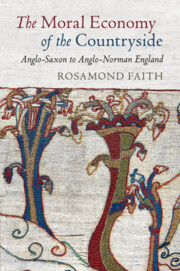Book contents
- Reviews
- The Moral Economy of the Countryside
- The Moral Economy of the Countryside
- Copyright page
- Contents
- Preface
- Abbreviations
- 1 Introduction: The Moral Economy
- Part I Rank
- Part II Reciprocity
- Part III Reputation and Witness
- 7 Neighbours and Strangers
- 8 Markets and Marketing
- Part IV The Wolf Sniffs the Wind
- Part V The Aftermath of Conquest
- Part VI In the World of the Manor
- Appendix The Family Farm in Peasant Studies
- Bibliography
- Index
7 - Neighbours and Strangers
from Part III - Reputation and Witness
Published online by Cambridge University Press: 25 October 2019
- Reviews
- The Moral Economy of the Countryside
- The Moral Economy of the Countryside
- Copyright page
- Contents
- Preface
- Abbreviations
- 1 Introduction: The Moral Economy
- Part I Rank
- Part II Reciprocity
- Part III Reputation and Witness
- 7 Neighbours and Strangers
- 8 Markets and Marketing
- Part IV The Wolf Sniffs the Wind
- Part V The Aftermath of Conquest
- Part VI In the World of the Manor
- Appendix The Family Farm in Peasant Studies
- Bibliography
- Index
Summary
Notions of a person’s ‘worth’ were socially created, This chapter looks for the notions of worth involved in the multifarious everyday transactions between people. As so much depended on others, peasant farmers could not afford to trust anyone who was not of good reputation. Fair dealing and the common good were important in the moral economy of working life not because transactions between neighbours were altruistic, nor even necessarily friendly, but because they were essential. Tenth century laws regulating the hundred built on a moral economy which valued good reputation and personal knowledge and in which co-operation mattered. Courts came to collective decisions, sworn oaths established truth and standing surety for another person meant that personal knowledge of the accused was essential. The witness of neighbours was vital when it came to questions of land: boundary clauses from the ninth and tenth century were based on detailed knowledge which only local people could provide. Peasant farmers became more formally part of the financial system when heregeld began to be levied.
- Type
- Chapter
- Information
- The Moral Economy of the CountrysideAnglo-Saxon to Anglo-Norman England, pp. 79 - 86Publisher: Cambridge University PressPrint publication year: 2019

